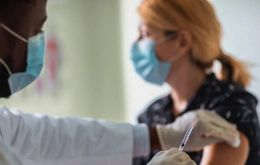MercoPress. South Atlantic News Agency
Tag: COVID-19
-
Friday, April 22nd 2022 - 18:56 UTC
PAHO says some countries not meeting vaccination targets despite proper supply

The Pan American Health Organization (PAHO) Friday reported that over two-thirds of the population in Latin America and the Caribbean is already vaccinated against COVID-19, although certain countries have yet to reach even half of their population.
-
Thursday, April 21st 2022 - 09:54 UTC
Falklands: Covid-19 community transmission confirmed at MPC, protective measures recommended

Protective measures for all Falkland Islands residents are being advised following a number following a number of cases of COVID-19 being confirmed at MPC. The Commander British Forces South Atlantic Islands implemented a number of precautionary measures at Mount Pleasant Complex (MPC), following a number of positive COVID-19 cases which were identified outside of quarantine it was announced on April 15. This action enabled BFSAI and the Falkland Islands Government to understand the situation in depth.
-
Thursday, April 21st 2022 - 09:40 UTC
US gov't appeals judge's ruling ending mask mandates

The US Department of Justice (DOJ) Wednesday confirmed it finally filed an appeal against a Florida Federal Judge's ruling which has for the time being brought the mandatory wearing of facemasks on public transport to a halt.
-
Wednesday, April 20th 2022 - 12:23 UTC
Cases of dengue on the rise in Brazil

Brazilian health authorities Tuesday announced the number of probable cases of dengue fever nationwide had nearly doubled since the beginning of the year compared to the same period in 2021.
-
Wednesday, April 20th 2022 - 09:30 UTC
US: Biden administration abides by Fla. Judge ruling ending mask mandates

The US Justice Department Tuesday said it would only appeal Monday's ruling by Florida Federal District Judge Kathryn Kimball Mizelle ending President Joseph Biden's mask mandate in public transport units if the Centers for Disease Control and Prevention believes the requirement is still necessary.
-
Monday, April 18th 2022 - 22:55 UTC
Pepe Mujica against blanket VAT reduction

Former Uruguayan President José “Pepe” Mujica said the Government's blanket cut to the VAT should apply only to the needy people; otherwise, it becomes a benefit to those who can actually afford to pay full tax.
-
Monday, April 18th 2022 - 22:47 UTC
Bolsonaro questioned over freedom of press by UN

Amid growing concerns on the part of the United Nations regarding attacks on the press, Brazilian President Jair Bolsonaro announced he had requested a meeting with representatives of the WhatsApp application to have it increase the number of participants in messaging groups.
-
Monday, April 18th 2022 - 08:26 UTC
Brazil enters new phase in C19 crisis as cases drop significantly

Brazilian Health authorities Sunday announced a new phase in the fight against COVID-19 and the subsequent lifting of most restrictive measures adopted since 2020 to curb the spread of the disease.
-
Saturday, April 16th 2022 - 08:32 UTC
Further boat crossings between Argentina and Paraguay to resume Monday

After more than two years during which they were stopped amid the numerous sanitary restrictions to fight the spread of COVID-19, boat crossings between Paraguay and Argentina are scheduled to resume Monday at various points.
-
Saturday, April 16th 2022 - 08:12 UTC
Bolsonaro's supporters fared worse off throughout C19 crisis

A local scientific study in Brazil has established that those areas where President Jair Bolsonaro had the most votes in his 2018 campaign were also the ones with higher COVID-19 mortality rates, it was reported Friday.
